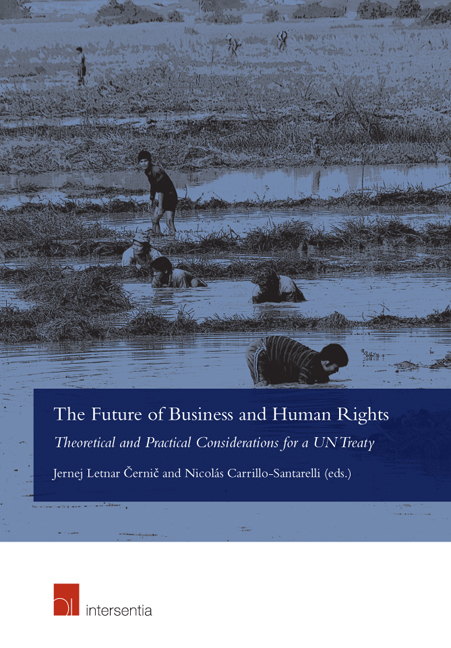Book contents
- Frontmatter
- Dedication
- Acknowledgements
- Contents
- About the Contributors
- Introduction
- Part I The Convenience and Possibility of Adopting a Treaty on Business and Human Rights
- Part II Critical Analyses Of A Treaty On Business And Human Rights
- Considering a Treaty on Corporations and Human Rights: Mostly Failures but with a Glimmer of Success
- ‘Band-Aids Don't Fix Bullet Holes ’: In Defence of a Traditional State-Centric Approach
- Voluntary vs. Binding: Civil Society's Claim for a Binding Instrument
- Part III Regional Approaches
- PART IV Lessons from other Regimes of International Law
- Conclusion
- Index
Considering a Treaty on Corporations and Human Rights: Mostly Failures but with a Glimmer of Success
from Part II - Critical Analyses Of A Treaty On Business And Human Rights
Published online by Cambridge University Press: 11 October 2018
- Frontmatter
- Dedication
- Acknowledgements
- Contents
- About the Contributors
- Introduction
- Part I The Convenience and Possibility of Adopting a Treaty on Business and Human Rights
- Part II Critical Analyses Of A Treaty On Business And Human Rights
- Considering a Treaty on Corporations and Human Rights: Mostly Failures but with a Glimmer of Success
- ‘Band-Aids Don't Fix Bullet Holes ’: In Defence of a Traditional State-Centric Approach
- Voluntary vs. Binding: Civil Society's Claim for a Binding Instrument
- Part III Regional Approaches
- PART IV Lessons from other Regimes of International Law
- Conclusion
- Index
Summary
INTRODUCTION
Is it necessary or advisable to draft a treaty on corporations and human rights? What ought to be the content of that treaty? What ought to be the objectives and implications of such a treaty for enterprises, non-governmental organisations (NGOs), individuals and states? These questions, emerging simultaneously with and in part propelled by the complex transformations that produced economic globalisation, were at the foundation of a decades-long and fruitless effort through the United Nations that started in the 1970s with the unsuccessful quest to produce a Code of Conduct for Transnational Corporations and ended with the failure of the draft UN Norms on the Responsibilities of Transnational Corporations and Other Business Enterprises with Regard to Human Rights in the first years of the 21st century. By 2011, these questions appeared to have been answered as the United Nations Human Rights Council unanimously endorsed what from that time became the UN Guiding Principles for Business and Human Rights (UNGP).
But the UNGP did not prove to be a sufficiently authoritative or comprehensive answer for all stakeholders, key elements of which were not thrilled by events that led to the adoption of the UNGP, and less by the UNGP itself. That discontent was at first internal to the UNGP discussion and discrete, taking definitive form on the eve of the adoption of the UNGP. It became more open and vocal after 2011, and led to substantial mobilisation of political power in the years thereafter as both civil society actors and small and developing states began considering alternatives or supplements to the UNGP and the means to achieve their adoption.
Ironically, the post-endorsement architecture created by the UN Human Rights Council provided a site for advancing and consolidating discontent. The post-UNGP endorsement mechanism is centred on a Working Group. The Working Group is charged, among other things, with bringing states, enterprises, NGOs (and a motley crew of others) together to meet a number of objectives to move the UNGP project forward. But it also became a site for growing criticism of and eventually opposition to the UNGP themselves as the way forward. Within that space, discontent evolved to mobilisation and eventually to the invocation of institutional mechanisms to challenge the primacy of the UNGP as the central element of managing the human rights impacts of economic activity.
- Type
- Chapter
- Information
- The Future of Business and Human RightsTheoretical and Practical Considerations for a UN Treaty, pp. 89 - 110Publisher: IntersentiaPrint publication year: 2018
- 2
- Cited by



